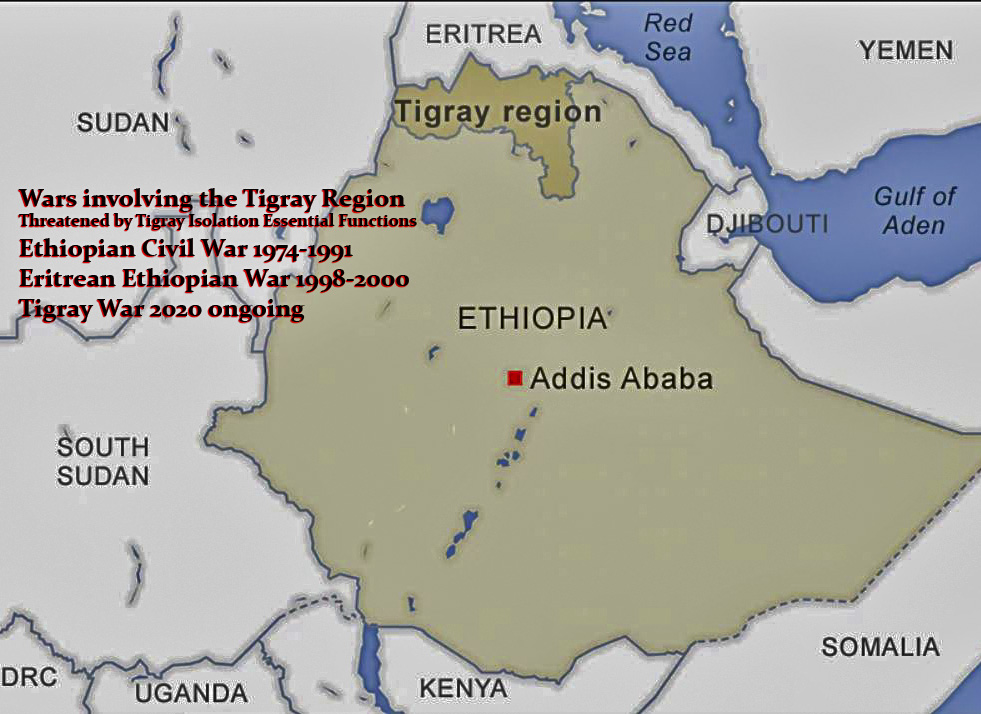
Over almost a century the Tegaru people and their Tigray state has been at war three times with neighboring factions which always put them in a siege state. Long distance dependence for food, fuel, transportation hubs, and administrative government centers have adversely affected their ability to prepare and respond successfully to war time threats to their survival. Currently the Tigray Regional National State is in a fight for its existence with the Ethiopian national government and its allies while being held to a near complete siege.
Whether Tigray will be in a position to have self determination is not clear. The war continues without a clear victory at this point. But lets assume for the moment that either an outright military victory or a negotiated settlement happens. There are some belated lessons learned from the history of the Tigray state from the Derg war, the Eritrean war, and finally the situation of the Tigray state in the last years of Meles Zenawi as Prime Minister of Ethiopia which can no longer be ignored if the Tegaru people and the Tigray state want to stop the cycle of recurrent threats to survival.
Lessons from previous war experience that create siege risk for Tigray
- The Ethiopian government under Meles Zenawi leadership made a big mistake not taking down the Esaias regime of Eritrea. This allowed Esaias to be like a snake in the grass whose venom became more poisonous waiting for the right day to strike. Additionally not incorporating Eritrea into Tigray would have give Tigray a seaport. Instead Ethiopia was left landlocked and Tigray access to a seaport was not under Tigray regional control.
- Mekelle the capital of Tigray did not share in the grand development of Addis Ababa, the capital of Ethiopia. Mekelle University and the other smaller universities where smartly developed as centers for intellectual and professional development outside the Amharic elite environment which contributed to a continued strong sense of Tegaru identity and potential. However, the one Ethiopian airline was based in Addis Ababa and even though the Alula Abanega airport in Mekelle was well designed with capacity for large jets it was totally dependent of functions in Addis Ababa. There was no cargo or passenger service based in Mekelle, no maintenance or repair, and no aircraft inventory Mekelle based.
- Although the Tekezé dam and Ashegoda windfarm turbines have the capacity to serve millions of homes and industry they were under national control from Addis Ababa without any local control or service functions.
- Internet and phone service were mostly based on equipment and service from Addis Ababa.
- The banking system was centrally controlled by Addis Ababa who could shut down its function literally remotely by controlling the computerized banking functions.
- The Tigray Regional Health Bureau like the other regional states are very weak entities. Decisions regarding purchasing, development, personal management and development are centrally based to Addis Ababa
- Similarly the University system was centrally controlled in terms of budget approval, staffing planning, program development. Thus customization to meet Tigray regional state needs and control were in Addis Ababa.
- Even if the Tigray state rejoins the Ethiopian confederation it must continue to reserve the right to train and have its own defense force including the military academies in Mekelle. There should be ground forces, air forces, and significant equipment to provide a reasonable defensive capability. Additionally a strong mandatory military service of young men and women in their youth to maintain a well trained reserve that can be called in time of threat must be instituted.
Thus whether Tigray remains in an Ethiopian confederation or becomes an independent state it is absolutely essential that the new Tigray state must address the above mentioned issues or it will be once again vulnerable to be choked and starved once again by an enemy intent to dealing it a deathblow.

